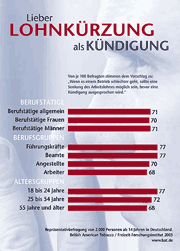New survey among working people: They prefer a pay cut to being laid off.
„Employees want dismissal protection to be individually flexible and socially just,“ says Professor Dr. Horst W. Opaschowski, head of the institute. „They want to have a choice and be able to decide for themselves whether they want to keep their job with less money or potentially lose it with a severance payment.“ In both cases, the costs for the employer are calculable. This guarantees legal certainty for employers without sacrificing employee rights. Both sides – employers and employees – can thus assess the cost of foregoing wages or losing a job. Legal action would be largely unnecessary.
So, when employees are given the choice between a pay cut and job loss, they opt for job security, even with a lower income. The employees' stance is quite pragmatic: individual protection against dismissal doesn't create new jobs, but it guarantees job security. The substance of dismissal law remains unaffected. This vote, of course, only applies to necessary redundancies and not to dismissals based on conduct or personal reasons (e.g., in cases of prolonged illness).
A change in thinking among the workforce:
„"Work longer – earn more!"“
How would employees decide if they could determine their own working hours? First of all, two out of five working people (42%) want to keep things as they are, meaning they are quite satisfied with the current arrangements. However, they do want to organize their working hours more flexibly and individually. And the younger the employees are, the stronger their desire for individualization. Professor Opaschowski: "Against the current backdrop of economic crisis and rising social security contributions, a radical shift in thinking is taking place among employees. Working longer – earning more: That is the contemporary response of employees, driven by fear of declining prosperity."„
Even in the 1990s, time culture dominated over money culture. The proportion of employees who advocated for shorter working hours and wage reductions steadily increased. Fewer and fewer people were enthusiastic about weekend work (1993: 20% – 1995: 19% – 2000: 15%). And a ten-hour workday with corresponding additional pay also found fewer and fewer supporters (1993: 21% – 1995: 19% – 2000: 14%).
Now, a significant shift in sentiment among the workforce can suddenly be observed:
- „In order to earn more,“ almost one in four employees (22% – workers: 24%) is now prepared to „occasionally extend their daily working hours to up to ten hours“ (women: 20% – men: 24%).
- The willingness to work weekends (Saturdays, Sundays, and public holidays) has also increased dramatically from 15 percent (2000) to 23 percent (2003) (women: 181% – men: 271%). Noticeable reluctance is only evident among civil servants (10%), while blue-collar workers show an almost three times higher percentage of interested individuals (271%).
- Even the most popular form of happiness, vacation, is up for debate for some employees. Some would even forgo part of their vacation (2000: 3% – 2003: 7%) if it would noticeably improve their household budget.
- And extending one's working life is no longer taboo for some employees. Working beyond the age of 65 and retiring later is something some employees (2000: 5% – 2003: 7%) can certainly imagine if it allows them to improve their standard of living or increase their pension…
""If the economic downturn persists, the attitude of 'buying more in order to afford more' could intensify among the workforce," says Professor Opaschowski. "Money culture is becoming more important than time culture again. After all, nobody wants to be among those who lose out in terms of prosperity. This issue brings two different lifestyle concepts into conflict: the proponents of a time culture, who favor a focus on time and want to get more out of life, and the advocates of a money culture, who want to maintain or improve their standard of living." Among the latter group, the self-employed and freelancers (111,130) as well as civil servants (91,130) are overrepresented, as they would gladly (=voluntarily) continue working beyond the age of 65. Among salaried employees, nine percent and among blue-collar workers, seven percent would continue working after reaching the official retirement age if they were allowed to.
„"Live longer – work longer!"“
Flexible retirement is no longer taboo.
Seven percent of all employed people support extending working life. Opaschowski: "Extrapolated, that would mean over two million employees in Germany currently falling victim to the guillotine-like nature of forced retirement and being involuntarily sent into 'retirement'. It would be more in line with the principle of intergenerational fairness if more older (and not just more younger) workers generated the pensions for an ever-increasing number of retirees." A higher retirement age – on a voluntary basis – could thus significantly alleviate the financial difficulties of the pension system.
Here, the flexible retirement model might be more suitable: a staggered retirement period with self-determined choices and a flexible retirement age. Ultimately, this means:
- Those who voluntarily retire early accept reductions in their pension (currently minus 3.6 percent for each year).
- Consequently, longer working lives also result in pension payments being increased (currently plus 6 percent for each additional year worked).
Instead of focusing solely on the negative aspects of demanding higher pension deductions in socio-political discussions, the positive aspects of already available supplements should also be more widely publicized. For example, as confirmed by the German Pension Insurance Association (VDR), those who work until age 67 receive a 12 percent higher pension for life. This is already a reality, yet it remains largely unknown.
„A flexible opening of the retirement age in both directions – downwards (e.g., to 63 years) with pension reductions and upwards (e.g., to 67 years) with pension increases – is the working time model for the 21st century,“ according to the head of the BAT Institute. Life expectancy in Germany increases by two to three months every year. Therefore, those who live longer and work longer are not missing out on life.



